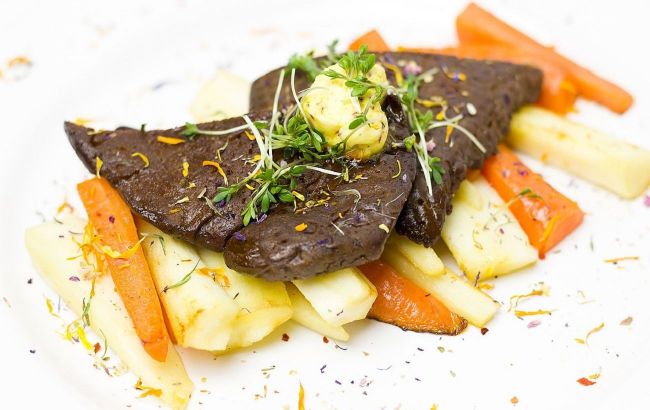This meat substitute rapidly gaining popularity: Is it beneficial for body
 Photo: The benefits of seitan for the body (wikipedia.org)
Photo: The benefits of seitan for the body (wikipedia.org)
Seitan is a meat substitute, also known as wheat meat. The product is made from wheat protein—gluten—mixed with water (and spices) after thermal processing.
Is such a product beneficial? Find out more on RBC-Ukraine.
What you need to know about Seitan
The combination of gluten and water has no flavor on its own; flavor is added with appropriate seasonings. While many may not realize it, wheat protein is present in most plant-based meat and sausage products, as well as in burgers and other non-meat dishes.
Though seitan is a traditional product in East Asian cuisine, with its production documented as early as the 6th century AD, it has never been as popular as it is now, as more people adopt vegan and vegetarian diets.
Wheat protein, obtained by washing starch from wheat flour, unfortunately, is not a complete protein. Since it lacks sufficient amounts of all essential amino acids, it is considered a low-quality protein. Gluten is missing lysine, but this compound can be obtained from other protein sources, particularly legumes.
Therefore, products that also contain soy or pea protein may be more valuable. Seitan-based meat substitutes consumed as part of a varied vegan diet shouldn't pose a problem, as they often include legumes, tofu, and soy milk, which supply the missing amino acids.
How much protein and calories are in seitan
Seitan is rich in protein and relatively low in carbohydrates, fat, and calories. A 100g serving typically contains 130-150 kcal and up to 25-30g of protein, which is more than in beef tenderloin. The same portion has less than 10g of carbohydrates and under 5g of fat. This fat is cholesterol-free and has a low content of saturated fatty acids.
During processing, wheat gluten loses vitamins but retains some iron, calcium, and other micronutrients.
Is seitan healthy
Although pure wheat protein is a highly processed product, seitan, made from it, can be part of a healthy diet. This depends on the other ingredients present in both processed and homemade versions.
Making seitan from natural ingredients allows for a healthier meat substitute.
However, the health effects of seitan are debated, especially because some people cannot eat gluten. It is not recommended for people with celiac disease or gluten intolerance, as gluten can cause inflammation and damage to the intestines. Gluten intolerance and, in rare cases, wheat protein allergies are also contraindications.
Gluten is difficult to digest, particularly in large amounts, which can lead to digestive issues, such as bloating, gas, and constipation. In cases of poor gluten tolerance, it can cause diarrhea, abdominal pain, fatigue, irritability, and even depression-like symptoms.
For those who tolerate gluten well, seitan can be a nutritious addition to the diet when eaten a few times a week, as it provides a good source of protein.
Also, read how to improve your diet.
Sources: data from Healthline and Clinikally websites.
This material is for informational purposes only and should not be used for medical diagnosis or self-treatment. Our goal is to provide readers with accurate information about symptoms, causes, and methods of detecting diseases. RBС-Ukraine is not responsible for any diagnoses that readers may make based on materials from the resource. We do not recommend self-treatment and advise consulting a doctor in case of any health concerns.

